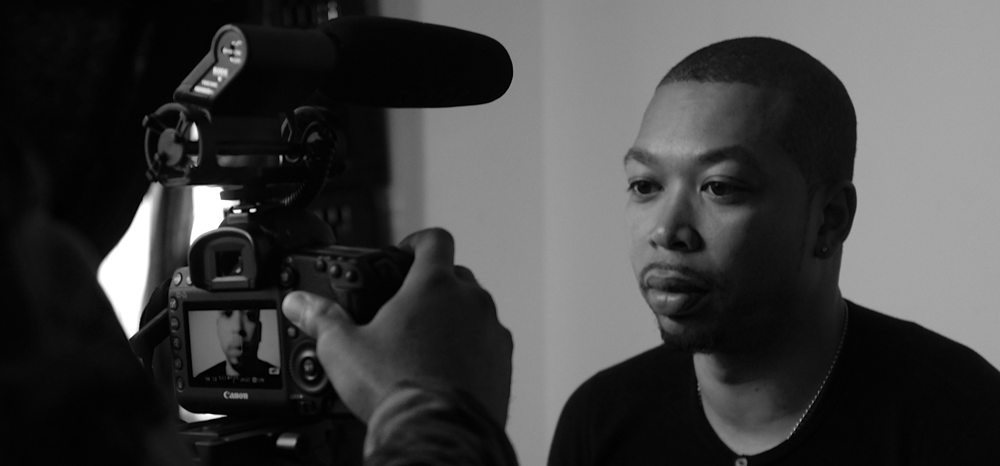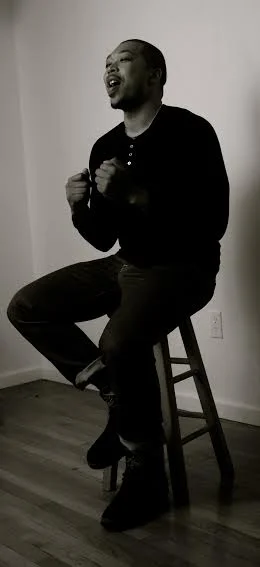Days before he releases his latest EP “The Other I,” artist Malachi Rivers is preparing to chase his dream of stardom out West.
By Jonathan Randles
It's March and it's still cold enough in Bed-Stuy to see your breath and hip-hop artist Malachi Rivers is sitting in an apartment he's never been in before. Perched on a stool, staring into a photographer's camera, he starts talking to two strangers about music and about his life. He starts talking about his plan to escape.
In nine months, he'll be living in Los Angeles and, God willing, performing enough to make music and acting his job. Permanently. California is the key to busting into the entertainment industry, leaving behind a string of humdrum day jobs and living the life he's always dreamed of: the life of a professional artist.
But right now that's all part of a future that doesn't exist and Los Angeles is 3,000 miles west and even further away spiritually. As he speaks into the camera, it becomes clear that at this moment, before New York's miserable winter finally gives way to spring and before he releases “The Other I” — his most ambitious music project to date—Malachi Rivers is at a crossroads.
Despite crushing the underground slam poetry scene, despite opening shows for Common and Gil Scott-Heron, despite touring Europe with famed jazz artist Marcus Strickland, Malachi hasn't been able to make the jump to performing full-time. Instead, he's spent the last two years stuck behind a desk in Manhattan as the office manager for a company that publishes a newsletter for corporate attorneys, a readership that's mostly old, overwhelmingly white and about as hip-hop as Mitt Romney.
So it's appropriate that in this buttoned-up work world, Malachi Rivers the boisterous performer, the energetic showman, chooses to keep his stage persona under wraps. At the office he goes by his legal name, Greg Owens. Far removed from the stage and surrounded by the white walls and cubicles that symbolize modern corporate life, Greg is soft-spoken and unassuming, blending into an office filled with mild-mannered writers and editors. “I have an On-Off switch,” he says. “I become a different person when I'm on stage. I become Malachi.”
Back in Bed-Stuy, I prod him into belting out a few lines of “Ol' Man River” after he mentions he grew up with a fondness for black spirituals. His voice fills the room as he sings and, for a moment, it seems like the sound could burst through the walls of this tiny apartment. I picture him at the pulpit preaching the Good Word to a congregation of thousands. His professors tried to persuade him to pursue a career in opera. The point is this: Malachi Rivers was not put on this earth to waste away in an office.
***
Soon, Malachi is set to drop “The Other I,” a six-song EP that explores his psyche, sometimes through the perspective of fictional characters he says represent different aspects of his personality (“The Other I” is a literal translation of alter ego). The EP opens with "Showtime", a song brimming with bravado, excitement and a thumping “Bombs Over Baghdad” snare drum. "Showtime" is energetic throughout, but Malachi blows the lid off the song during an uninterrupted lyrical flurry that grabs your ears for nearly a minute and serves as the track's frenetic apex.
He says he wanted each song on “The Other I” to sound as though it could have been written and performed by a different artist. “It's all these different elements going on, but they're all a part of my personality and make me who I am,” he says. The brashness of "Showtime" is juxtaposed with a stripped-down track called "What We Had" where he raps about a breakup. One particularly personal line recalls the torment he feels imagining his ex sleeping with another man. “Nightmare in my bed sweaty palm hands shakin'/Caught off guard you and him my mind racin',” he says over the song's slow-droning drumbeat.
Malachi couldn't have made "The Other I" a few years ago . On his previous EP, “Stereo Sound Escape,” he says he worried about fitting the archetype of a 'conscious rapper'. Every line had to be clever or convey a deeper meaning. The pressure he put on himself to sound that way lead to some forced verses that didn't reflect his personality. “I got in my way by having to have everything be so structured and so deep. And it's so interesting, because people who knew me were like, 'It's good, but you're a fun person,'” he says. “I didn't realize how much of my personality did not show through with the work I did before.”
Malachi's desire to be a conscious rapper flowed from his first love: spoken word poetry. His experience as a poet, along with a strong neo-soul influence, still shape the sounds on his latest recording; the difference now is that “The Other I” holds nothing back. Nowhere on the recording is this new freedom more evident than on the last song he wrote, “Hollywood Story,” The song tells the tale of an actress whose dreams of stardom quickly evaporate after she moves to Los Angeles and, out of money and options, ends up turning tricks to make ends meet.
"Hollywood Story” has an undercurrent of anxiety: the same Malachi Rivers feels as he prepares to move across the country in pursuit of his own dreams of stardom. “She started out with hopes and dreams, but the industry made her feel like she wasn't going to make it,” he says. Or put another way: what if he doesn't make it?
***
Now in his early 30s, Malachi admits he's thought about quitting music more than once. "I literally had a breakdown this past Tuesday. This is stuff I would never talk about when I was younger, but you get to a certain point and it's like, this is who you are," he says. He was scrolling Facebook to pass time at work when he started seeing posts from other artists he's rubbed elbows with in New York who, unlike him, don't have to clock in every day.
It got to him. “You see them blow up and you just think,” he pauses,“well, when is it my time?” It was a reminder that he doesn't want to spend the rest of his life sitting behind a desk.
Whatever the future holds, it's unlikely Malachi Rivers' transition to Los Angeles will be more difficult than his move to New York. After graduating college in Maryland, he came to the city in the early 2000s with $180 in his pocket. He told his mom that he was going to New York for a few days just to visit. But that was a lie, he had no intention of leaving the city. “I decided to step out on faith,” he says. He got a part-time job at Macy's and bounced around New York, every night sleeping on a different friend's couch and keeping to himself that he didn't have a permanent place to live.
Eventually, he found an apartment overlooking a cemetery in Cypress Hills in East New York. The living situation sucked. At night he could hear his roommates having sex. He had no control over the temperature in his room so when it was hot, he was sweating bullets and he'd sleep with a coat on when it was cold. Money was tight so he wasn't eating much, either. With a hint of nostalgia in his voice, he says that at the time he looked like a lollipop—big head and a stick for a body.
His early struggle to find a foothold in the city didn't stop him from building connections, though. He worked with Dooglebug from Digable Planets and collaborated on other projects. He got his first real taste of success while touring Europe with Marcus Strickland's band, something he did on and off for four years. They traveled the Netherlands, performing at dance halls, auditoriums, and music festivals in Rotterdam and Amsterdam. Private cars came to chauffeur the band to venues. Flowers and food greeted them in their dressing rooms. “It's a different level of respect in the way they treat artists,” he says of the culture overseas. The band ate well and at the coffee shops, indulged in spectacular marijuana.
It was different coming back to the U.S. where he'd pick up odd jobs to make ends meet. Mostly, that meant doing grunt work at hotels around the city. It's while he was doing hotel work that he had one of the most profound what the fuck moments of his life. It's impossible to say whether everyone has experienced a true what the fuck moment, but spend enough time folding clothes, stocking shelves, cleaning bathrooms, or doing some other shit job you don't like, it's a near certainty that eventually you'll stop whatever terrible thing you're doing and give serious thought to the question what the fuck am I even doing with my life?
Malachi Rivers' what the fuck moment came while working the nightshift at the Double Tree Hotel in Times Square when, one night, he was ordered to clear out the trash bins on each of the hotel's 42 floors. While taking out the trash, one bag literally busted on him—showering him in garbage. Covered in trash, he stood there for a good long time wondering how in the hell he got into this mess and, more importantly, how the hell he was going to get out of it. Being covered in trash convinced him to leave the Double Tree behind, a decision that ultimately lead him to finding his current office job.
Malachi performing in Bed-Stuy
His time in New York forced him to grow physically and emotionally. No longer a lollipop, Rivers stands 6'1” and weighs nearly 200 pounds. His arms are thick and sculpted, and he's lived in Harlem for several years, a place he now calls his second home.
His perceptions about himself has also changed. He long considered himself the oddball of his family because as he was bouncing around New York and hustling to get on stage, his younger sisters followed a more stable path—one sister works in international business and the other is about to get her master's in forensic science. While he says his family has always supported him, he's wondered if they truly understand the paths he's taken. He says he was heartened recently when his sisters told him they looked up to him and marveled at his ability to get on stage and perform.
Reflecting on his time in the city, he says he views all his ups and downs as part of a journey that's made him who he is today and also helped shape the sound of “The Other I”. Music, he says, has been an emotional outlet that's helped keep his life and goals in perspective—something that hasn't always been easy for a person with lofty ambitions.
“I thought that I would not have to wake up and clock in with a 9 to 5 by now. I thought that I would have a lot of money in the bank. I thought I was going to be living the 'successful artist lifestyle' by now,” he says. “But what I realized is, maybe I just wasn't ready at the time because I have never in my life been more confident as a person than at this point. When I thought I wanted it, I realized I probably would have been beat up.”
Armed with new artistic confidence that permeates “The Other I," he says that more than ever before he's ready to face his future in Los Angeles and whatever the industry throws at him. Malachi Rivers is confident that his time is coming, that's there's something greater than an office desk waiting for him on the West Coast. Whether Los Angeles holds the key to busting into the entertainment industry remains to be seen. But whether it is or it isn't is besides the point; when his hair is grey, Malachi Rivers has no intention of looking back and asking himself, "What if?"
Sure moving across the country is a giant step. But shit, if you're not willing to take a few big swings in life, you probably don't belong under the bright lights anyhow. And with or without the fame he seeks, bet that Malachi Rivers is not the type of man to go hungry. “I will hustle,” Malachi Rivers says, a knowing smile comes across his face. “I'll do what I gotta do to make ends meet."
Listen to more of Malachi Rivers' songs here.
Published May 2015


